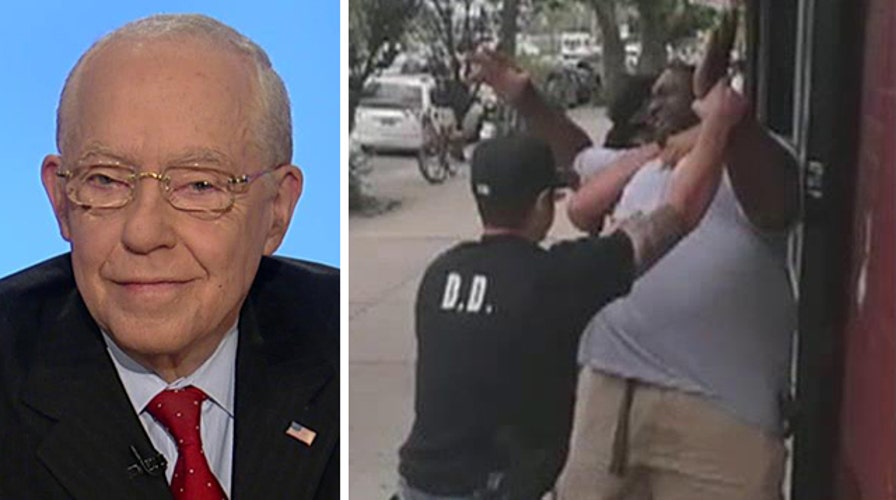Michael Mukasey offers legal insight on Eric Garner case
Former attorney general reacts to Justice Department plans to conduct investigation into chokehold death
Among the many irresponsible statements and actions that have followed the encounters of Michael Brown and Eric Garner with police officers in Ferguson, Missouri and New York City, count the repeated linkage of the two cases by media, public officials and ideologues.
Further, the Brown and Garner cases – substantially different from one another – have been linked rhetorically as well with the cases of Rodney King in 1992 in Los Angeles and Trayvon Martin in 2012 in Miami, in a sort of national Rorschach test, with the viewer invited to describe a pattern.
Ideologues, abetted by many in the media, have encouraged the public to see in the death of Michael Brown and Eric Garner a pattern that supports a narrative of persecution of black citizens by white police officers.
Of course, there are superficial similarities: all involved confrontations between young African-American men and police officers – or, in the 2012 case of Trayvon Martin, a civilian who served as a neighborhood watchman but who, for narrative purposes, appears as a police figure; the young men in all cases were resisting the police to a greater or lesser degree; all the young men suffered physically at the hands of the police; three of the four – all save Rodney King – were killed.
Ideologues, abetted by many in the media, have encouraged the public to see in the death of Michael Brown and Eric Garner a pattern that supports a narrative of persecution of black citizens by white police officers.
None of the police officers directly involved were African-American. Although the functional police officer in the Trayvon Martin – George Zimmerman – self-identified as Hispanic, in the divide between people of color and whites, he is placed in the white column; indeed, The New York Times – the arbiter of bien pensant liberalism – referred to him as a “white Hispanic.”
Of the four cases, two thus far resulted in the bringing of criminal charges against the police. Three of the four police officers who beat Rodney King in Los Angeles initially were acquitted of state charges (the jury hung as to one defendant) but then were indicted for federal civil rights violations and two were convicted.
Zimmerman, who fatally shot Trayvon Martin, was indicted by a Florida grand jury after enormous pressure was brought to bear on the local district attorney by the federal government, including in their public comments on the case by the president – who said if he had a son he would look like Trayvon Martin -- and the attorney general; Zimmerman was acquitted.
In the other two, both of which took place this summer, no charges have been filed against the officers involved.
Between the time of the Rodney King case and the others, this country elected its first black president and confirmed its first black attorney general. Between the time of the Rodney King case and the others, policing in the inner cities of this country – led by New York – brought crime rates down to historic lows, principally to the benefit of blacks and other minorities, thousands of whom are alive today as a result. That policing, of course, required both black and white officers to put their lives at risk daily.
In truth, these are four discrete tragedies, with no meaningful connection to one another.
Nonetheless, ideologues, abetted by many in the media, have encouraged the public to see in the death of Michael Brown and Eric Garner a pattern that supports a narrative of persecution of black citizens by white police officers.
The Mayor of the City of New York has gone so far as to say that he and his wife warn their African-American son to be wary of contact with police officers, although that young man spends a good deal of his time being protected by the same police detail that protects his parents and although he is statistically at greater risk from other black males than any other group.
That Brown was videotaped in the robbery by force of a convenience store just before he was shot, and that powder burns on his hands showed he had tried to grab the officer’s gun, which in any event was being used for the first time in the officer’s career; or that the sergeant who commanded the white police officers involved in the death of Eric Garner was herself a black woman – are swept aside by the torrential force of the persecution narrative. Thousands of demonstrators in dozens of cities have chanted slogans and obstructed the orderly lives of hundreds of thousands of their fellow citizens.
What may well come of all this is that police officers all over the country will become far less proactive than they have been in dealing with crime. If officers who receive a call of a crime in progress speed to the scene, they may well interrupt or prevent it; but they may also find themselves in a confrontation with suspected perpetrators that winds up in the headlines. Far simpler to slow down a little, and simply write a report about a completed crime. If that is in fact the result, many of those swept up in the heedless idealism of the moment may live long enough to regret it, and some may not live that long.

